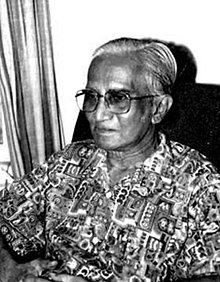Ediriweera Sarachchandra
This article includes a list of references, related reading, or external links, but its sources remain unclear because it lacks inline citations. (April 2016) |
Ediriweera Sarachchandra | |
|---|---|
 | |
| Sri Lankan Ambassador to France | |
| In office 1974–1977 | |
| Personal details | |
| Born | 3 June 1914 Galle, Sri Lanka |
| Died | 16 August 1996 (aged 82) Colombo, Sri Lanka |
| Spouse(s) | Ailean (Beleth) Sarachchandra, Lalitha (Swarna Perera) Sarachchandra |
| Children | Nanaditha Sarachchandra, Sunethra Sarachchandra, Kisagothami Sarachchandra, Yashodhara Sarachchandra, Ransi Sarachchandra |
| Education | St. Aloysius College, Richmond College (Sri Lanka), St. John's College, St. Thomas' College, University of Colombo, University of London |
| Awards | Honorary D. Litt. from the University of Jaffna, Honorary D. Litt. from the University of Peradeniya in addition to the Professor Emeritus |
| Website | sarachchandra |
Ediriweera Sarachchandra (Sinhala: මහාචාර්ය එදිරිවීර සරච්චන්ද්ර) (3 June 1914 – 16 August 1996) was a Sri Lankan playwright, novelist, poet, literary critic, essayist and social commentator. Considered Sri Lanka's premier playwright, he was a senior lecturer at the University of Peradeniya for many years and served as Sri Lankan Ambassador to France (1974–1977).
Early education
Sarachchandra was born on 3 June 1914. He completed his early education at Richmond College in Galle, St. John's College Panadura, S. Thomas' College, Mount Lavinia and St. Aloysius' College in Galle.
Sarachchandra started his career as a teacher at St. Peter's College in Colombo 4. He then joined the publishing company Lake House in an administrative position. 1933, gained admission to the Ceylon University College and offered Pali, Sanskrit and Sinhala for the first degree and passed out in 1936 with a first class and sat for the Ceylon Civil Service examination (because of his parents insistence) and came first in the island.[1]
In 1939 Sarachchandra wed Aileen Beleth. He subsequently travelled to Santiniketan to study Indian Philosophy and Music. Sarachchandra returned to Sri Lanka in 1940 and resumed his teaching career at St. Thomas College in Mt. Lavinia. From 1942 to 1944 he worked on his Master's degree in Indian Philosophy as an external student of the University of London while holding the position of Sub-Editor of the Sinhala Dictionary.
Sarachchandra returned to the University of Ceylon serving as a lecturer in Pali from 1947 to 1949. He gained entry to the University of London in 1949 to study towards a post graduate degree in Western Philosophy.
Theatre
Sarachchandra produced his first stylist play Maname in 1956 to widespread acclaim. Maname is generally considered the first real Sinhala drama, signalling the transition from the Nadagam or folk drama to the modern theatrical drama format. It was praised especially for drawing influence from the traditional nadagam play style. He continued as a playwright, developing his play Sinhabahu in 1961, which is widely considered as his best work. Most of his plays were adaptations from Buddhist Jathakas or Sinhala folklore giving his work instant and lasting popularity with the population that identified with their roots.
Awards and honours
The University of Jaffna and the University of Peradeniya conferred Sarachchandra the degree of Doctor of Literature in 1982. Also in that year he was made an Emeritus Professor at the University of Peradeniya. In 1983 the State of Kerala in South India awarded Sarachchandra the Kuran Asian World Prize. In 1988 he won the Ramon Magsaysay Award for Literature.
Plays
- Maname Listen to Maname Online
- Sinhabāhu Sinhabahu Full Stage Drama (YouTube)
- Elowa gihin Melowa Āwā
- Rattaran
- Pabāvatī
- Lomahaṃsa
- Bhavakaḍaturāwa
- Vessantara
- Mahasara
- Kada walalu
- Pematho jayathi soko
- Kirimuttiya Gangea Giya – 1985
- Bahina kalawa
- mudalalige peraliya
Books
Novels
- Malagiya Eththo (1959)
- Walmath Wee Hasarak Nudutimi (1962)
- Malwunge Awrudhuda (1965)
- Loku Putha Nohoth Bandulage Parawarthaya (1971)
- Heta Echchara Kaluwara Ne (1975)
- Wilasiniyakage Premaya (1988)
- Curfew and a Full Moon (1978)
- With the begging bowl (1986)
- Foam Upon the Stream (1987)
- foam on the curfew
Short Stories
- Kalayage Awemen (1969)
- Maya Roopaya (1974)
- Roopa Sundari (1984)
- Midiya, Gruhaniya ha Upasikawa (1993)
- Of a Queen and a Courtesan (1970)
- The Death of a Friend (1981)
Research, Literary Theory and Criticism
- Sahithya Vidyawa (1949)
- Sinhala Nawakatha Inthihasaya ha Wicharaya (1951)
- Kalpana Lokaya (1958)
- Natya Gaweshana (1967)
- Wes Muhunuda Sebe Muhunuda? (1971)
- Modern Sinhalese Fiction (1943)
- The Sinhalese Novel (1950)
- The folk Drama of Ceylon (1952)
- Buddhist Psychology of Perception (1958)
Other
- Ape Withthi (1942)
- Asampurna Charika Satahan (1967)
- Dharmishta Samajaya (1982)
- Pin Ethi Sarasawi Waramak Denne (1985)
See also
External links & References
- Sarachchandra Org
- The 1988 Ramon Magsaysay Award for Journalism, Literature and Creative Communication Arts, CITATION for Veditantirige Ediriwara Sarachchandra
- SYMPOSIUM: SRI LANKA'S CULTURAL EXPERIENCE Between Home and the World
- Sarachchandra the diplomat – a few recollections
- Integral dramatist, doyen among intellectuals
- Professor Ediriweera Sarachchandra
- 1914 births
- 1996 deaths
- Sri Lankan academics
- Sri Lankan dramatists and playwrights
- Sri Lankan novelists
- Alumni of the Ceylon University College
- Alumni of Richmond College (Sri Lanka)
- Alumni of St. Aloysius' College (Galle)
- Alumni of St. John's College, Panadura
- Alumni of S. Thomas' College, Mount Lavinia
- Academics of the University of Ceylon (Colombo)
- Academics of the University of Ceylon (Peradeniya)
- Ambassadors of Sri Lanka to France
- Sinhala-language poets
- Sinhalese writers
- People from Galle
- 20th-century novelists
- 20th-century poets
- 20th-century dramatists and playwrights
